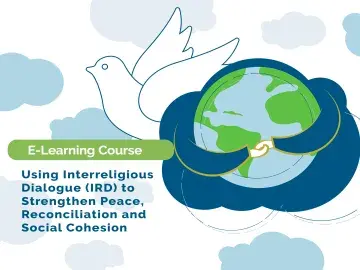Using Interreligious Dialogue (IRD) to Strengthen Peace, Reconciliation and Social Cohesion
While interreligious dialogue benefits from being a scientific field of study, it also enjoys great applied capacity for everyday human life, within all contexts and for all situations. If the importance of interreligious dialogue may have been questioned twenty years ago, nowa-days its necessity has become obvious, and many would argue even urgent. The practice of using interreligious dialogue (IRD) for building social cohesion, peace and reconciliation is rapidly emerging as a necessary tool for the twenty-first century education tool-box.
In this context, and with regards to the need to fill the existing lack of accredited academic e-learning courses on interreligious dialogue, KAICIID has developed an e-learning course entitled, “Using Interreligious Dialogue (IRD) to Strengthen Peace, Reconciliation and Social Cohesion”. The course has been customized to address the evolving needs of religious leaders, policy- and decision makers, KAICIID Fellows, faith based organizations, interna-tional organizations, civil society organizations, and government officials.
It is the result of a collaboration with renowned universities such as the University of Montreal, the Complutense University of Madrid and the Institute for the Sciences of Religions in Barcelona.
Goal: This e-learning course aims to strengthen the capacities of religious leaders, policy- and decision makers, KAICIID Fellows, faith based organizations, international organizations, civil society organizations, and government officials within the field of interreligious dialogue. It includes the basic concepts, methodologies, models and tools needed to use interreligious dialogue for peace and reconciliation.
Specific Objectives:
- To provide basic knowledge and skills in interreligious dialogue
- To outline the historical background of interreligious dialogue from the five major religions of the world (Buddhism, Christianity, Hinduism, Islam, and Judaism) and clarify the geopolitical aspects of these religions
- To present the various elements of interreligious conflicts through real examples and case studies
- To explain how to use key theories, models and methods in interreligious dialogue as scientific tools in a given conflict situation, and illustrate the diversity and the complexity of the factors that play a part in interreligious dialogue
- To explain and critically analyze factors which affect or escalate interreligious conflict situations
Learning Objectives:
At the end of the course participants will be able to:
- Demonstrate developing skills and knowledge of interreligious dialogue concepts, tools and methodologies
- Identify initiatives and best practices for addressing Islamophobia Christianophobia and Anti-Semitism at the national and local levels
- Understand the conceptual landscape of dialogue, as well as the concepts and models of using interreligious dialogue for peace
- Experience an innovative approach to education on interreligious dialogue as a new scientific field
Week 1, Module 1: Theories and Methods in Interreligious Dialogue: A Brief Overview
Week 2, Module 2: A Brief History of the Modern Interreligious Dialogue Movement
Week 4, Module 4: Prejudices and Stereotypes: How to Treat Islamophobia, Christianophobia and Anti-Semitism
Week 5, Module 5: Interfaith Dialogue on the Internet: The Religious Phenomenon in Virtual Communities and Social Networks
Week 6, Module 6: Interfaith Peace and Dialogue Models: From Harmony to Liberation
Week 7, Module 7: Interfaith Dialogue: A Venue for Peacebuilding
Week 8, Module 8: Outcomes of Dialogue Processes: Obstacles and Hopes
In order to ensure the best possible outreach, the course will be delivered through an interactive online platform, which allows users to take the course at their own pace. Course objectives are intended to be achieved through a variety of educational methods and technologies, designed to match personal learning styles, as well as by the inclusion of non-linear learning that aims to develop just-in-time learning skills for adults. At the same time, in order to allow participants maximum flexibility of scheduling, the learning will be conducted in an asynchronous manner.
Using a state-of-the-art training architecture, the KAICIID E-Learning Programme will combine self-learning with tests, assessments and online discussions.
The pedagogy has been adapted for full-time career professionals and is specifically tailored to help train participants through various experiences: absorb (read); do (activity); interact (socialize); reflect (relate to one’s own reality).
The KAICIID E-Learning Programme is pleased to offer an e-learning course in IRD, specifically designed to address the evolving needs of religious leaders, policy- and decision makers, KAICIID Fellows, international organizations, faith based organizations, civil society organizations, national and local government officials, IRD practitioners and representatives from academic and training institutions to learn the key concepts, methodologies, models and tools for how to use interreligious dialogue to strengthen peace, reconciliation and social cohesion.
Modern and updated browsers.
The practice of using interreligious dialogue (IRD) for building social cohesion, peace and reconciliation is rapidly emerging as a necessary tool for the twenty-first century toolbox. KAICIID e-learning courses build the capacities of global leaders to address a number of today's most pressing challenges by using IRD to establish ethical policymaking frameworks, support peace processes, and address discrimination and religiophobia at national and local levels. The courses are part of an ongoing collaboration with renowned universities such as The Universite de Montreal, the Complutense University of Madrid, and the Institut Superior de Ciencies Religioses de Barcelona.
E-Learning in IRD designed for the general public


